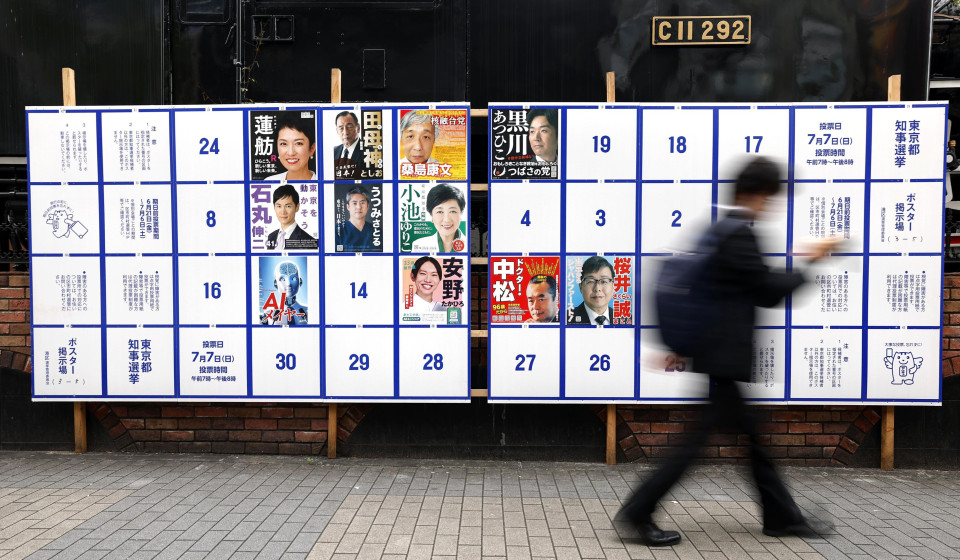The upcoming Tokyo gubernatorial election is generating great intrigue as the two frontrunners, the incumbent Yuriko Koike and her opposition-backed challenger Renho, have each over decades built eminent political careers with parallels that elevate the stakes for both the capital's and country's future.
Both Koike, 71, and Renho, 56, were TV anchors, lawmakers, ministers and party leaders with national leadership aspirations. They built reputations as upwardly mobile women whose way with words allowed them to blaze a trail to the very top of Japan's male-dominated political arena.

During their tenure as lawmakers, neither Koike nor Renho built notable legislative legacies, some analysts say, adding that their respective decisions to shift focus from national politics to Tokyo's top job -- Koike eight years ago and Renho this year -- shows their profiles have waned.
Nevertheless, the analysts believe neither Koike nor Renho have completely abandoned their aspirations of becoming Japan's first female prime minister, a career pathway that could pass through the city assembly in Shinjuku.
Hiroshi Shiratori, a political science professor at Hosei University, said Koike and Renho might use the Tokyo election to "springboard" into the running for prime minister, win or lose.
On the policy front, Koike and Renho have both zeroed in on the need to encourage people to have children. Koike has promised to boost support for families with children while Renho has pledged to work for higher salaries for younger generations who think they cannot afford to start a family.
Sharing the same background as TV anchors, Koike rose to prominence in the conservative Liberal Democratic Party, while Renho played a role in the left-leaning Constitutional Democratic Party of Japan and its predecessors.
Koike was an anchor of a long-running economic news program before entering politics in 1992. She was first elected to the House of Councillors from the now-defunct Japan New Party and transitioned to the House of Representatives the next year.
After joining the LDP, Koike was appointed to her first Cabinet post as environment minister in 2003 under the administration of then Prime Minister Junichiro Koizumi. She became the first female defense minister in 2007.
As environment minister, she promoted the "Cool Biz" campaign to encourage workers to ditch their jackets and ties during the summer to cut down on carbon emissions from air conditioning.
In 2016, with Shinzo Abe ensconced as LDP leader and just a few years away from becoming Japan's longest-serving prime minister, Koike left the LDP to run for Tokyo governor, a move analysts interpreted as her giving up aspirations to become the party's president.
The younger woman's path to political prominence is remarkably similar.
Renho, born to a Taiwanese father and a Japanese mother in Tokyo, graduated from Aoyama Gakuin University in the capital. The former campaign model for an auto component maker became an anchorwoman for several TV programs in the 1990s.
She won her first upper house seat representing Tokyo in 2004 as a candidate of the now-defunct Democratic Party of Japan. She was in her fourth term, but was forced to give up her parliamentary seat when she decided to run in the current Tokyo governor race.
Renho is best known for her combative public pronouncements related to waste in government programs. The DPJ, a predecessor of the current leading opposition CDPJ, held power from 2009 to 2012, a period blighted by the 2011 Fukushima earthquake, tsunami and nuclear crises.
In 2009, Renho courted controversy with a query to bureaucrats that was interpreted as her questioning Japan's ability to build supercomputers that can compete on the world stage, especially against the United States and China.
"Why must we aim for the world's No. 1? What's wrong with being the world's No. 2?" Renho, then not yet a minister, asked.
Her question was repeatedly featured on TV programs, with the incident becoming a political albatross around her neck.
Koike and Renho, the latter of whom held multiple ministerial posts including one in charge of administrative reform, headed political parties. But their respective leaderships were short-lived due to poor electoral performances.
Koike established her national political party, called the Party of Hope, in the run-up to a lower house election in 2017, aiming to dethrone the then government under Abe. Her party, however, fared badly in the general election, prompting her to step down as chief.
In 2016, Renho became the leader of the then leading opposition party that took over the DPJ, but she resigned the following year in the wake of its poor performance in the Tokyo metropolitan assembly election.
While Tokyo's gubernatorial race is always closely watched, with voters able to directly elect the capital's governor from what often turns out to be a diverse range of candidates, the 2024 edition has an even higher profile due to controversies that have done reputational damage, warranted or not, to both Koike and Renho.
A former aide to Koike recently filed a criminal complaint against her claiming she falsified academic credentials by saying she graduated from Cairo University in Egypt. The Tokyo governor has denied the allegation.
In 2016, Renho came under fire for her former dual nationality, which is not allowed in Japan for anyone over the age of 22. She initially said she had relinquished her Taiwanese nationality but later walked back her explanation, admitting it had not been renounced as stated.
Renho eventually disclosed part of her family register to show she no longer possesses Taiwanese nationality.
With both women facing challenges that seemingly call their reputations into question, Tokyoites have the opportunity to choose which trailblazer they want to put their faith in for the future, with their decision likely to have ramifications for wider Japan as well.
Related coverage:
Poster pranks cause chaos in Tokyo gubernatorial election campaign
Tokyo governor race begins with Koike, opposition-backed Renho clash
 By Satoshi Iizuka,
By Satoshi Iizuka,









